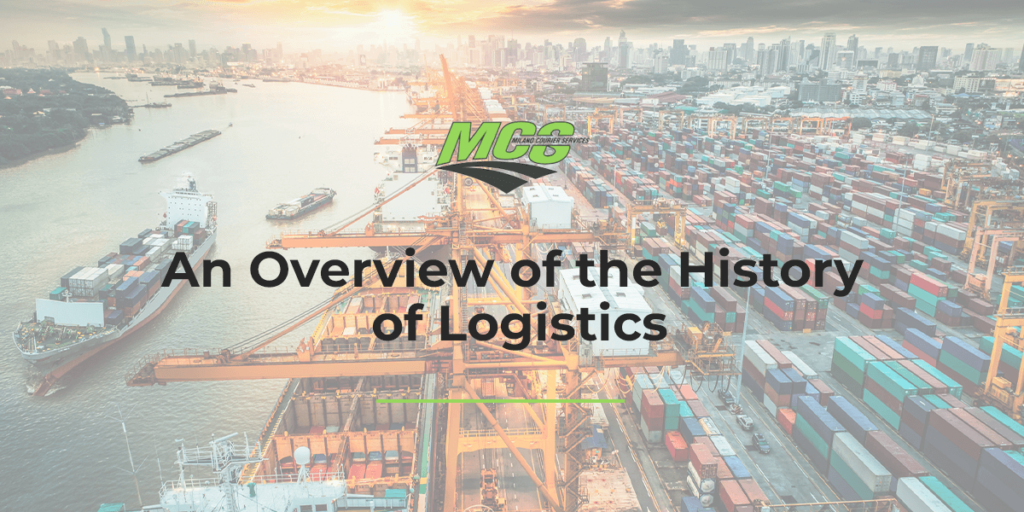The logistics industry as we know it now is an expansive, lucrative trade that many rely on for the transportation of goods. We have come to think of logistics as the shipment of products from a store to a customer, but logistics encompasses the entire process, not just the end goal. Logistics is the movement and management of materials through an organization—beginning with the acquisition of raw materials, to the conversion of those materials into a product or service, and finally the movement of a product/service to a customer after its purchase. At its core, logistics consists of two main definitions: the movement of resources from location to location and the planning of resources to be used for a project. However, the term originally had a narrower definition and application.
War Logistics

Prior to the evolution of the logistics industry into today’s extensive system, the term “logistics” referred to nothing more than a tool of the military, a type of science. Logistics referred to the supply, movement, and maintenance of materials within the military, particularly during time of war. These materials, however, were more than just weapons. The movement of personnel, such as the evacuation or hospitalization of soldiers, were a significant part of logistics as well. Since part of winning a war involves keeping a steady flow of resources to an army while simultaneously disrupting the supply chain of the opposing army, it is then no wonder that militaries would dedicate an entire branch of science just for studying how materials are moved around.
The word “logistics” was popularized in 1846 by a Swiss writer and military officer named Antoine-Heine Jomini when he used the French term “logistique” in his book The Art of War. The English translation of the word, the word we use today, became more popular, especially when the French later used the phrase “military logistics” instead. Although the term was used to describe a phenomenon that occurred within armies, its use could be applied more broadly both in time and concept. Logistics also referred to the use of castles as warehouses while horse-drawn carriages and boats transported goods from location to location. A system of logistics similar to our modern one can be seen as far back as ancient Greece and Rome. However, the commercial aspect of logistics—the movement of products from producer to consumer—did not begin to take hold until World War II, when manufacturing was crucial for the war.
Business Logistics

The rise of business logistics began in the 1960s with the help of globalization. Because computers and the Internet were becoming more accessible, the distance between people from different towns, different countries, different continents were becoming meaningless. Through the Internet, businesses now had access to a larger pool of potential customers. They had to expand their operations to accommodate this larger pool. Before the Internet, retail stores relied on direct deliveries for their goods to reach their customers. Direct deliveries meant the purchased items came directly from the suppliers rather than the actual retail stores. After the Internet, retail stores now recognized the need for a centralized location for their products, and this resulted in the creation of distribution centers—another aspect of commerce to manage.
The word logistics encompassed more than just the movement of resources from one location to another. It now also meant the detailed planning and implementation of a business or operation. Although technological advancements have changed the nature of modern warfare, military logistics have remained largely the same in both concept and execution. War logistics was and is still concerned with the movement of military resources from location to location, but business logistics, on the other hand, emerged as a concept with a lot of moving pieces. How businesses acquired their raw materials; how they converted their materials into products; how they advertised, sold, and shipped their products to customers—all of this was logistics. It was a form of logistics that would continue to complicate as businesses continued to establish and maintain global presences. In reaction, logistics as an industry of its own began to rise.
Modern Logistics

Fast forward to modern day, where businesses can reach customers all over the world through their websites, apps, and social media accounts—where numerous customers expect businesses to be able to deliver any product under the sun to their homes. Countless companies exist solely to transport goods around the world. Their service is to transport other services, and it is a very profitable one. The logistics industry makes an estimated eight to twelve trillion dollars annually, and this is no surprise considering how large the industry is now. A long list of fields now exists such as procurement logistics, distribution logistics, medical logistics, green logistics, reverse logistics, and on and on. And, of course, within these fields are professionals titled logisticians, experts of their craft.
With the rise of online companies and online commerce in general, both large and small businesses recognize the importance of this industry. Time and money are dedicated to the physical logistics of a business but also to the research on how to best optimize logistics. While large, global companies have their own internal teams to handle the planning and movement of their services, small businesses must find other means to reach their customers, usually relying on courier services to do so. Courier services act as middlemen for businesses that are desperate to address their consumers’ demand for delivered purchases. Individual people also utilize postal and courier services for their own needs, such as relocating furniture, sending gifts, or receiving groceries. The need for logistics has never been higher.
To accommodate this growing need, Milano Courier Services offers 24/7 service and same-day delivery. Operating out of Belmont, MA, we strive to provide the New England area with quick, quality service. Whether you are a company with products to ship, a hospital with time sensitive documents to send, or a person with bulky furniture to relocate, we are here and ready to serve.

